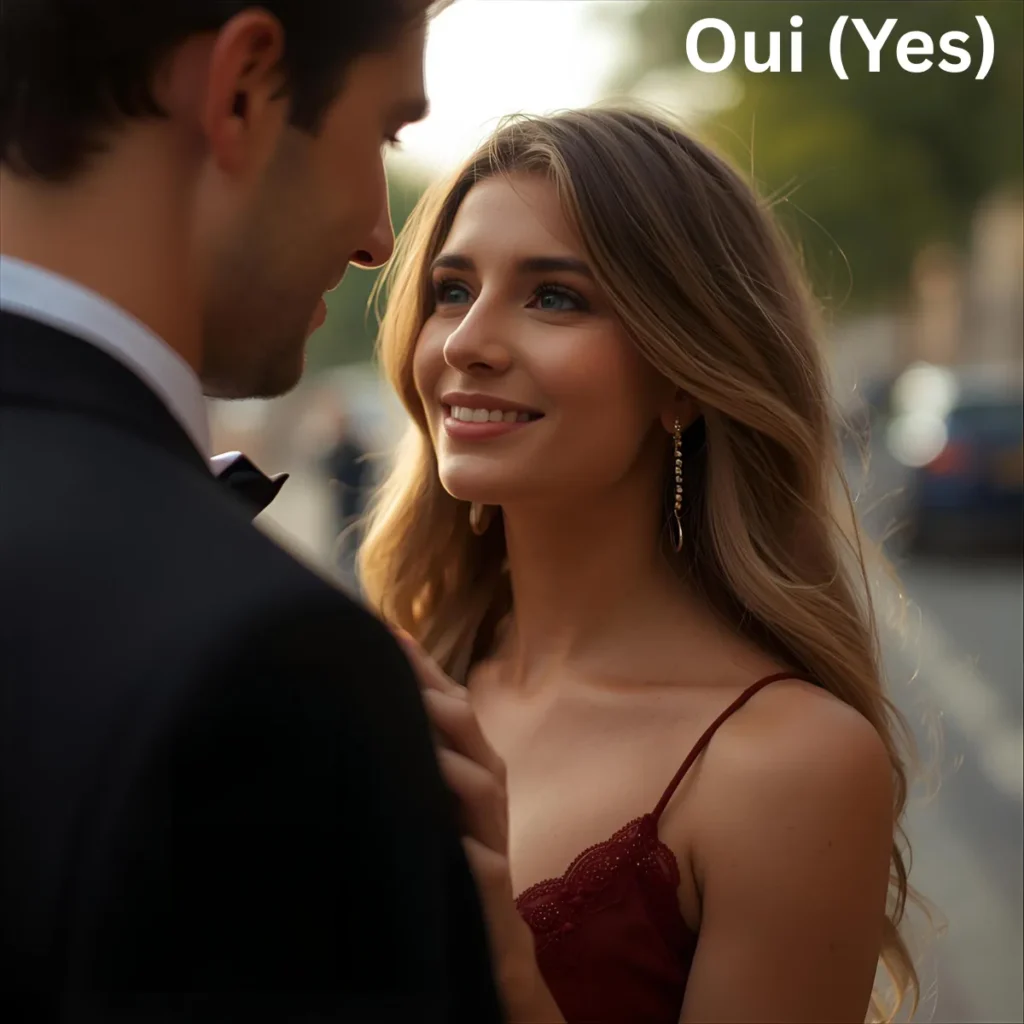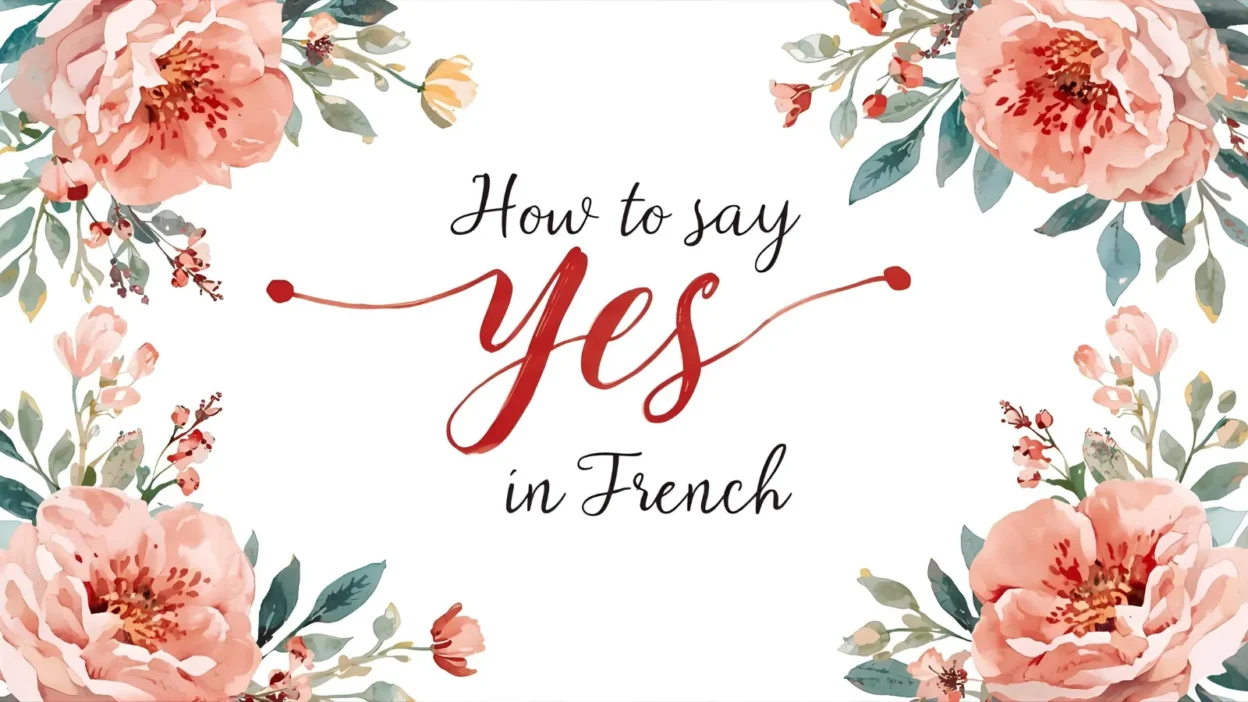Learning how to say yes in French is one of the first steps to sounding natural in everyday conversations. The most common word is oui, but there are different ways to agree depending on the situation.
You might wonder how to say yes in French to a guy, or even explore casual expressions like how to say yes in French slang to sound more authentic and friendly.
By learning these variations, you’ll be able to respond naturally in both formal and casual settings.
Say Yes in French
Let’s explore 15 different ways to say yes in French, complete with real dialogue examples and a peek into where each form comes from or how it’s used.
15 Ways to Say Yes in French
| No. | French Phrase | English Meaning / Usage |
|---|---|---|
| 1 | Oui | Yes (standard, most common) |
| 2 | Ouais | Yeah (casual, informal) |
| 3 | Ouais ouais | Yeah yeah (playful, informal emphasis) |
| 4 | Mais oui | But of course / Of course |
| 5 | Bien sûr | Of course / Sure |
| 6 | D’accord | Okay / Agreed |
| 7 | Absolument | Absolutely |
| 8 | Certainement | Certainly |
| 9 | Carrément | Totally / Definitely (slang, very casual) |
| 10 | Grave | Totally (slang, youthful) |
| 11 | Exactement | Exactly / That’s right |
| 12 | Évidemment | Obviously |
| 13 | Pourquoi pas | Why not |
| 14 | Avec plaisir | With pleasure (polite yes, often for offers) |
| 15 | C’est clair | It’s clear / Definitely (informal agreement) |
1. Oui (Yes)

Origin:
The most standard and universally known word for “yes” in French. It has been in use since Old French times, replacing the Latin hoc ille.
Example:
👤 User A: Tu veux du café ?
👤 User B: Oui, merci !
Use: The default “yes” — polite, formal, or informal.
2. Ouais (Yeah / Yep)
Origin:
A relaxed, casual version of oui, similar to “yeah” in English. Often used in spoken language and among friends.
Example:
👤 User A: Tu viens ce soir ?
👤 User B: Ouais, bien sûr !
Use: Informal; friendly, laid-back situations.
3. Si (Yes — to contradict a negative)
Origin:
Used specifically to contradict a negative statement. There is no English equivalent, making this uniquely French.
Example:
👤 User A: Tu n’as pas mangé ?
👤 User B: Si, j’ai mangé tout à l’heure.
Use: To say “yes” when someone expects “no.”
4. D’accord (Okay / Agreed)

Origin:
Literally means “in agreement.” First used in formal agreements but now widespread in daily speech.
Example:
👤 User A: On se voit à 18h ?
👤 User B: D’accord, à tout à l’heure.
Use: Agreeing to plans or suggestions.
5. Carrément (Totally / Absolutely)
Origin:
Originally meant “squarely” or “directly.” In modern slang, it’s used to strongly affirm something.
Example:
👤 User A: T’aimes ce groupe ?
👤 User B: Carrément ! Ils sont géniaux.
Use: Informal, enthusiastic agreement.
6. Bien sûr (Of course)
Origin:
Literally “well sure,” used since the 19th century to reinforce certainty.
Example:
👤 User A: Tu peux m’aider ?
👤 User B: Bien sûr, avec plaisir.
Use: Friendly, polite, slightly formal.
7. Volontiers (Gladly / Willingly)
Origin:
From Latin voluntarius, meaning voluntary or willing. Sounds old-fashioned but still heard today in polite or service contexts.
Example:
👤 User A: Vous voulez un café ?
👤 User B: Volontiers, merci.
Use: Polite or formal situations.
8. Absolument (Absolutely)

Origin:
Borrowed from Latin absolutus. Used to give a strong, confident yes.
Example:
👤 User A: Tu es d’accord avec ça ?
👤 User B: Absolument !
Use: Formal, confident, or passionate response.
9. Exactement (Exactly / Yes, that’s right)
Origin:
Used to confirm agreement with precision.
Example:
👤 User A: Donc, tu penses comme moi ?
👤 User B: Exactement.
Use: Formal or intellectual conversations.
10. Ça marche (That works)
Origin:
Literally “that works.” A modern, idiomatic way to agree on plans.
Example:
👤 User A: On se retrouve devant le cinéma ?
👤 User B: Ça marche !
Use: Casual, practical agreement.
11. C’est clair (Clearly / Totally)
Origin:
Slangy way of expressing strong agreement. Literally means “it’s clear.”
Example:
👤 User A: Ce film était trop long, non ?
👤 User B: C’est clair.
Use: Informal, often used with friends.
12. Grave (Totally / For sure)
Origin:
Slang that originally meant “serious” but is now used to show strong agreement — especially among younger people.
Example:
👤 User A: Tu veux aller à ce concert ?
👤 User B: Grave !
Use: Very informal and trendy.
13. Avec plaisir (With pleasure)

Origin:
Used in formal and semi-formal contexts to accept offers or invitations politely.
Example:
👤 User A: Tu veux te joindre à nous ?
👤 User B: Avec plaisir !
Use: Polite and warm; often in hospitality.
14. Parfait (Perfect / Yes, perfect)
Origin:
Used to express enthusiastic agreement with a plan or idea.
Example:
👤 User A: On se retrouve à midi ?
👤 User B: Parfait !
Use: Casual to semi-formal; approving tone.
15. OK (Okay)
Origin:
Borrowed from English — yes, even in French! Pronounced more like “oh-kay,” and used widely.
Example:
👤 User A: Tu m’envoies ça par email ?
👤 User B: OK, pas de souci.
Use: Casual, universal — especially in modern communication.
FAQs
1. What is the simplest way to say yes in French?
The simplest and most common word is Oui, which directly means “Yes.”
2. How do I say yes politely in French?
Simply saying Oui, s’il vous plaît (Yes, please) or Oui, merci (Yes, thank you) adds politeness.
3. Are there casual ways to say yes with friends?
Yes! You can use Ouais, which is informal and friendly, similar to “Yeah.”
4. How do I say yes in a formal or professional setting?
Use Oui, certainement (Yes, certainly) or Bien sûr (Of course) for a more professional tone.
5. Can I express agreement without saying “Oui”?
Yes, phrases like Bien sûr (Of course), Absolument (Absolutely), or Exactement (Exactly) also show agreement.
6. How do kids usually say yes in French?
Children often use Oui or casual Ouais, depending on their age and familiarity.
7. Can body language enhance saying yes in French?
Yes! Nodding your head while saying Oui or Bien sûr reinforces agreement and politeness.
8. How do I say yes in text messages in French?
Short forms like Oui, Ouais, or even Oki (informal) are often used in texting.
9. Is there a playful or slang way to say yes in French?
Young people may say Yep, borrowed from English, in casual conversations.
10. How do I emphasize a strong yes in French?
You can say Oui, absolument! (Yes, absolutely!) or Oui, bien sûr! (Yes, of course!) to show enthusiasm or certainty.
Conclusion:
Mastering how to say yes in French goes beyond just knowing oui. By exploring variations—from polite forms to slang—you can adapt your responses for any situation. Whether you’re agreeing with a friend, speaking to a guy, or using casual French, saying yes naturally will make your conversations more fluent and culturally authentic.



